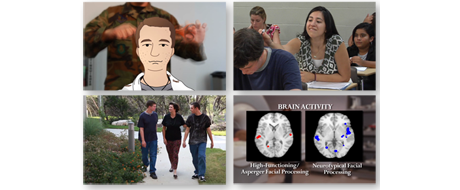Below are excerpts taken from interviews for the documentary, Coping to Excelling: Solutions for school-aged children diagnosed with High-Functioning Autism or Aspergers Syndrome. We hope this aids you in your on-going quest seeking information on HFA and AS as well as the knowledge you are not alone in your plight to succeed under the diagnosis.
An amazing discovery still being understood and uncovered today involves a revolutionary find in the human mind. Over 50 years ago, Austrian pediatrician, Hans Asperger, revealed to the medical and scientific community a form of high-functioning Autism later named Asperger Syndrome. These people have always been viewed as eccentric or odd displaying repetitive behaviors and totally lacking in their social skills. The disgusted and disapproving looks you and your child may be receiving when in public or with extended family only adds to the frustration and pain.

I know. My name is Jennifer Allen and my son, Sam has Asperger Syndrome. The challenges may be great, but so can be the results. Pooled information from experts in the field of Autism is provided below so we, as parents, can successfully guide our child through a social and judgmental world.
The High- Functioning Autistic or Asperger brain is different, in its function and in its anatomy. This is not a choice the child makes. In other
words, it’s not bad parenting nor bad behavior, they are wired
differently! -Dr. Janessa Manning
Medical reports reveal a profound discovery in the brain of those with High-Functioning Autism. Studies with MRI imaging document an actual physical difference in some areas of the autistic brain verses that of a neuro-typical brain. Also the neurological pathways fire differently in Asperger patients than that of a typical brain function.
Bottom line, High-Functioning Autistic and Aspergers diagnosed individuals receive their gifts and struggles from a physical and medical basis not behavioral, as you may have been pressured to believe.
So once we understand from whence the challenges occur then we can begin to lead them on the path from Coping to Excelling. –Jennifer Allen

According to Dr. Temple Grandin: “I want to emphasize that Asperger’s and Autism are not separate conditions. Asperger’s is just the milder end of the continuum. There’s no black and white dividing line between a mild case of autism and geek and nerd. They are the same thing. It is a continuum of traits. The mind can either develop to be more thinking and cognitive or it can be developed to be more social. There’s a point where it just merges into part of your personality.”
The two conditions have very few differences, and research proves which treatments are relevant to High Functioning Autism and also applicable to Aspergers Syndrome. Thus both disorders are combined and the treatments suggested should serve your child well.
It is a lifelong condition and occurs in boys four times as often as girls. Because “Aspie” children are not mentally slow, doctors usually do not diagnose them until they are in the early elementary school grades.
In order to be diagnosed with Aspergers Syndrome, a person must show two of these 4 traits:
- “Marked impairment” regarding nonverbal social cues (doesn’t make eye contact, doesn’t understand others’ body language, etc);
- Failure to make friends;
- Lack of appropriate social and emotional responses to others
- Inability to spontaneously share enjoyment, interests and achievements with other people.
In addition, the person must show one of these 4 behaviors:
- An abnormal and intense interest in one subject;
- Adherence to a strict set of rules, routines and rituals;
- Repetition of certain mannerisms like hand flapping, hair twisting or even whole body movements;
- An obsession in the parts or mechanics of objects.
Experts agree that once the shock of having an Autistic Child has waned, it’s time to start accepting and getting pro-active on your child’s behalf.

William H. “Billy” Edwards, MS, BCBA
Behavioral Specialist, Billy Edwards, created the following three-step strategy for getting proactive.
- Give yourself the permission to grieve about it because it’s okay.
- The second step is to begin finding resources and the first resource you look for is probably what parent support mechanisms exist, and
- The third component of that would be who are the professionals that you are going to surround yourself with and that are going to help guide you?
- Explaining the diagnosis to your child will be easier for you and for them to accept the younger they are. Take a positive approach by listing the positive characteristics as well as having a plan of action for the more challenging ones. This will make the step easier.
A graduate of Abilene Christian University, Jennifer had a long career in TV Broadcasting. Upon learning her oldest son Sam had a form of Autism called Asperger’s Syndrome, she left her career and became a full-time mother to both of her sons. Jennifer elicited the participation of her family and together they produced several independent programs including a children’s animated series titled Ameriquest Kids, as well as a documentary and book titled, Coping to Excelling: Solutions for School-age Children Diagnosed with High-Functioning Autism or Aspergers Syndrome. She formed the nonprofit Asperger101 to provide on-going free resources related to ASD at Aspergers101.com and has implemented the Texas Driving with Disability Program and continues to grow the statewide initiative today. She and her husband have recently retired to their property in the Texas Hill Country.



My son is 13…we are having some mild issues …it hard to figure out what is age and hormones and what. Is from the autism…there seems to be so much help when they are younger but not as much as they get older…